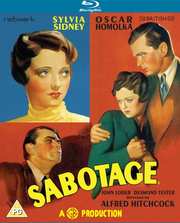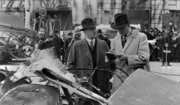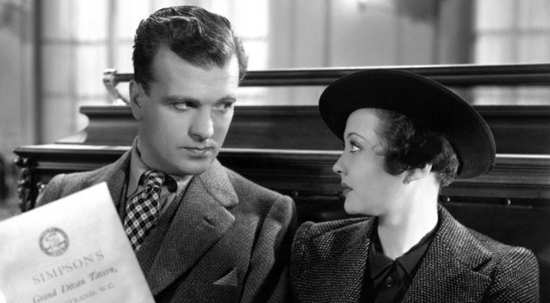Review for Sabotage
Good old Network! Following hot on the heels of some of their other early-Hitchcock ‘first time to Blu-Ray’ titles, ‘Sabotage’ makes a most welcome release. Not only is it an absolutely brilliant film (despite being 80 years old), this is an excellent transfer and well worth the upgrade from DVD.
‘Sabotage’ (not to be confused with Hitchcock’s 1942 film, ‘Saboteur’) is based on Joseph Conrad’s ‘The Secret Agent’ and stars Oscar Homolka (The Seven Year Itch) and Sylvia Sidney (Fury).
Karl Verloc, a German émigré and manager of a small London cinema, is secretly involved with a gang of European saboteurs who, among other things, are plotting a bomb attack in Piccadilly Circus. Although Verloc is a careful man, the police already have him on their radar and have placed an undercover officer in a nearby fruit and vegetable store to keep an eye on him.
The film serves as a great reminder than London has always been a bustling city although clearly a more sociable one back then when everyone knew everyone else’s business. In the days before supermarkets and frozen foods and microwaves, people would run down to the corner shop for fresh vegetables just moments before preparing the evening meal.
As a result it’s not long before Mr. Spencer (John Loder), the undercover detective, is on first name terms with Verloc’s family; his pretty young wife and her younger brother, Stevie (Desmond Tester), who is still just a schoolboy.
Although Hitchcock was still arguably learning his craft, there is no doubt that ‘Sabotage’ carries the auteur’s hallmarks. The story must have appealed to Hitchcock’s sense of drama and suspense. It’s a sad state of affairs that the storyline is as relevant today as it was during the tense run up to Britain’s involvement in WWII and the fearful rise of the Nazi’s.
On the surface, Verloc (irresistibly cast here as a cinema manager, living in quarters accessed by walking through the cinema itself) is a gentle, kind man. But we know better. The film opens with him sabotaging Battersea power station by pouring sand into some critical works, throwing London into a temporary black-out. As we later learn, its impact was ‘laughed away’ by plucky Brits who enjoyed the excuse to return to candle-lit conversations and the genereal bonhomie which ensued as a result. Consequently, Verloc’s contact (who meets him in London Zoo’s aquarium which is little changed since that time and which features a fleeting cameo by Carry On stalwart Charles Hawtry as a young teenager) want to do something far more disruptive, like a bomb in Piccadilly tube station. Verloc is to be the man to leave it there, a task which is he is most uncomfortable with yet he knows he must do.
The plot thickens when Spencer starts to have feelings for Verloc’s wife Sylvia, something that seems apparent from the outset. What is less clear when his true identity as a detective is revealed is whether the feelings are real or merely part of the undercover act.
The dramatic end of the film ties up all the loose ends with justice being done to all deserving it, including the bungling mercenary bomb-maker who creates the bomb for Verloc to use in Piccadilly.
It’s incredibly difficult to describe the neat way the film resolves all its issues and tensions without including spoilers and I have no intention of doing that.
There is one scene in the film that, on its release, caused outrage for its shocking cruelty yet, on reflection, after the rise of the Nazis and the consequent atrocities across Europe, it doesn’t seem out of place or unnecessarily harsh today. Indeed, Hitch was already clearly in no mood to compromise his drama by watering down the harshness of what ‘Sabotage’ might actually entail.
There is a notable use of montage in the film, something so admired by Hitchcock who was fascinated by the language of editing and the film opens with a close-up of a flashing bulb which quickly cuts to a street scene and back again. This is just one of many examples, another being the terrifying ‘bus’ sequence where we see close-ups of various clock-faces intercut with scenes on the bus and on the streets outside. (I won’t spoil things by telling you what happens on the bus but if you know the film then you’ll recognise the reference).
There is no doubt that ‘Sabotage’ is among Hitchcock’s darkest films. It contains a prescient foreboding that was certainly tapping into the country’s state of mind at the time. It’s also a film that has great merit if taken out its historic context and assessed purely as a thriller. It’s certainly an excellent film even on that basis alone.
Not only does the film look incredible, it comes with a couple of worthwhile extras.
First up is an introduction by film academic and Hitchcock ‘expert’ Charles Barr which is very illuminating. I wonder if this is better viewed after the film though as he discusses many aspects of the film you are about to see.
Secondly is a short featurette, clearly filmed as a part of a series called ‘On Location’ which explores some of the British locations used in classic films. Presented by Robert Powell, it’s a bit staccato and dated (probably filmed in the early 90’s at a guess) but does highlight some interesting ‘then and now’ clips from the film and what the places look like today. Perhaps what’s most interesting is how little changed many are – particularly London Zoo. An image gallery is also included.
Any self-respecting Hitchcock fan will want to add this wonderful HD transfer of ‘Sabotage’ to their collection. It’s a film that rewards endless re-watching and this edition represents a noticeable uplift from previously issued DVD versions.





































Your Opinions and Comments
Be the first to post a comment!